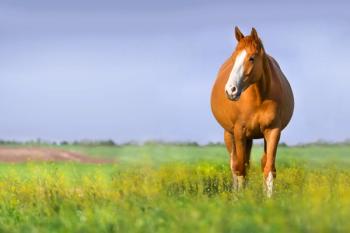
Horse slaughter debate continues
Washington ? Horse slaughter facilities were granted a reprieve Feb. 7 as the U.S. Department of Agriculture (USDA) approved their petition to pay for their own inspections.
WASHINGTON — Horse slaughter facilities were granted a reprieve Feb. 7 as the U.S. Department of Agriculture (USDA) approved their petition to pay for their own inspections.
The decision upset legislators who tried to halt the practice by nixing federal funding for ante-mortem inspections in the USDA budget bill passed last year. But USDA Spokesman Steven Cohen says the language used requires the Food Safety Inspection Service (FSIS) to continue its obligation to ensure meat is suitable for domestic use and export.
"It is the understanding of the conferees that the department is obliged under existing statutes to provide for the inspection of meat intended for human consumption (domestic and exported)," the USDA budget bill states. "The conferees recognize that the funding limitation in Section 794 prohibits the use of appropriated funds only for payment of salaries or expenses of personnel to inspect horses."
Median financial ratios
Four people at the USDA Food Safety Inspection Service, including two veterinarians, inspect horse slaughter facilities; the USDA was unable to determine whether those inspectors will continue in their current capacity when the fee-for-service agreement begins March 10, Cohen says.
"The amendment and the other language on this issue that was included in the appropriations bill conference agreement clearly indicates the acknowledgment of FSIS' responsibilities under the federal Meat Inspection Act to inspect horses for slaughter," Cohen says. "So we feel as though we have no choice but to initiate this fee-for-service program for ante-mortem inspection to ensure that animals that are slaughtered for domestic or export are properly inspected."
The program will charge $43.64 per hour for facilities inspections, the same rate FSIS charges for species absent from the federal Meat Inspection Act, including Bison and Ostrich.
The sudden end-around congressional intent likely will drive interest into the existing proposals for permanent bans on horse slaughter, according to Dr. Mark Lutschaunig, who oversees welfare issues as assistant director of governmental relations for the American Veterinary Medical Association, which opposes slaughter bans. H503 is under review by the Energy and Commerce Committee, and S1915 is being considered by the Commerce, Science and Transportation Committee. But Lutschaunig says the bills are more likely to find their way out of committee now that horse slaughter continues.
Representatives John Sweeney of New York, John Spratt of South Carolina and Ed Whitfield of Kentucky are leading the charge for H503. Sen. John Ensign of Nevada is pushing S1915.
"Congressman Sweeney and Congressman Whitfield in the House and Sen. Ensign in the Senate will be more apt to try to push those bills through now. But it seems like this is more an issue for the House than the Senate," Lutschaunig says. "It is very important to Whitfield and Sweeney, and they are not going to let it die. They are really going to push hard to get the bill moving."
AVMA opposes slaughter ban legislation primarily because it fails to address the plight of unwanted horses that typically end up in slaughter houses, says Governmental Relations Director Dr. Michael Chaddock.
"We don't have a stake here in whether or not these horses should be used for human consumption," Chaddock says. "The AVMA's issue is the welfare of the horses."
Major concerns include availability of alternative homes for the about 70,000 animals that are slaughtered each year, who will shoulder the cost (about $1,825 per horse per year, according to the American Association of Equine Practitioners) of basic care for displaced and unwanted horses, administration and oversight of retirement facilities, and environmental concerns related to carcass disposal.
Then there is a more tangible issue: economics.
"The AAEP doesn't think that this will prevent slaughter because we think they will just go to Canada and Mexico," says AAEP Executive Director David Foley. "No one is sure of what will really happen, but we think that without this option available and no other options presented, these horses have to go somewhere."
AAEP spearheaded the Unwanted Horse Coalition last year to help educate owners and legislators on some of the issues that plague unwanted animals. The coalition is apolitical, Foley says, but as it works to devise a governing structure, it is courting the only breed non-specific equine lobbying organization on Capitol Hill to house the education effort.
"We have drafted a memorandum of understanding that we would like to enter into a relationship with the American Horse Council, so actually the American Horse Council's foundation will serve as sort of the umbrella organization for this coalition," Foley says, adding that many of the alliance members already are AHC members.
The formal proposal was expected to be submitted to the AHC Board of Trustees this month.
For more information about the Unwanted Horse Coalition, visit
Newsletter
From exam room tips to practice management insights, get trusted veterinary news delivered straight to your inbox—subscribe to dvm360.




